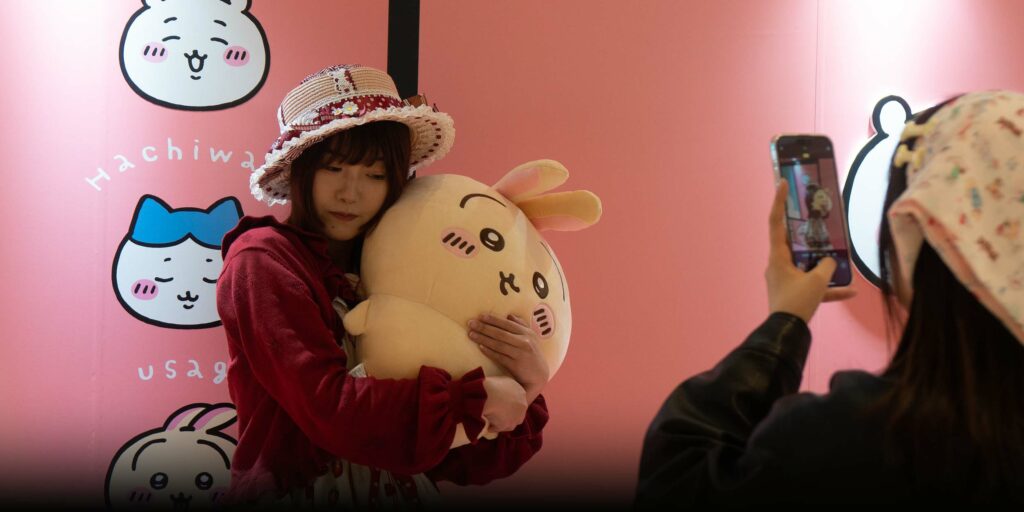A cute, fluffy hamster, a cat with a distinctive eye patch, and an eccentric rabbit known for its unique sounds — these are the stars of Japan’s hugely popular Chiikawa animation series, now causing a retail frenzy in China.
Dubbed “digital ibuprofen” on social media, their comforting stories and adorable appearances are helping young Chinese escape real-life stresses. And in recent months, pop-up stores featuring Chiikawa merchandise have drawn massive crowds, with products selling out within hours.
Following a viral social media marketing campaign, its first pop-up store alone — operating between March 29 and May 5 in Shanghai at Chinese discount retailer Miniso — drew floods of enthusiastic fans.
Hundreds lined up for hours to get their hands on Chiikawa merchandise, ranging from a 49.9 yuan lunch bag to a 520 yuan oversized doll. The store sold 8 million yuan ($1.1 million) worth of goods in just three days after opening its doors.
“An introvert and a bit shy, Chiikawa is like another version of me in a parallel universe,” said Li Rongrong, a 24-year-old white-collar worker, as she browsed through a new pop-up store in Shanghai with a friend earlier this week.
Until now, Chiikawa merchandise was not widely available in China, compelling eager fans to use proxy shoppers to purchase items from abroad at significantly higher prices. Qiu Yajing, a 23-year-old from Hubei, recalled buying a Hachiware doll — a Chiikawa character with cat features — in Japan for 100 yuan, which was being sold by proxies in China for 300-500 yuan.
Following the success in Shanghai, similar stores have now launched in other top-tier cities, including Beijing, Shenzhen, and Chengdu, since March. One of the latest pop-up stores opened on May 13 in the eastern city of Suzhou and will continue operations until June 20.
In addition to themed pop-up stores, Chiikawa products are also available through various online sales channels, including e-commerce platforms and livestreams.
A Japanese manga series by Nagano, Chiikawa revolves around the everyday adventures of its three leading characters.
The protagonist, Chiikawa, which means “small and cute” in Japanese, is a playful hamster full of insatiable curiosity. It loves chasing bugs and squirrels and enjoys cuddling.
Accompanying Chiikawa is the aforementioned talkative and loyal friend Hachiware, a cat that lives alone in a cave. Hachiware always offers help whenever Chiikawa is in trouble. Usagi, the rabbit, is loved for its eccentric and nonchalant temper.
Though serialized online since 2020, Chiikawa has recently surged in popularity in China, initially gaining traction within the country’s internet meme and slang culture. The series has since expanded its appeal beyond the ACGN (animation, comics, gaming, and novel) community.
To grow its digital presence, Chiikawa’s Chinese branding agency, JY Animation, launched official accounts on major content platforms Bilibili and Douyin, the Chinese version of TikTok, in January.
In just five months, these accounts amassed nearly one million followers, and related hashtags have drawn more than 8 billion views.
However, Miniso faced backlash after an ad campaign released on its official Douyin account on April 3 referred to the three characters as “Moron Crybaby Rat,” “Crazy Screaming Rabbit,” and “Blue Panties Cat.” The brand was forced to issue an apology the same day.
Behind the frenzy
Much of Chiikawa’s charm stems from its brief yet relatable episodes that spotlight life’s simple pleasures without dramatic twists. This minimalist storytelling resonates with a generation that prizes authenticity and the quiet, everyday victories over grand narrative arcs.
In the series, characters engage in tasks like mowing meadows and generating electricity to earn money for weapons to battle monsters, a narrative that Li Rongrong finds deeply relatable.
“They experience fear and even cry when facing fierce creatures, but they always muster courage, and their camaraderie offers comfort,” said Li, who graduated from university a year ago.
But in the world of Chiikawa, life is far from a fairy tale.
To gain better rewards, characters must pass exams to earn working certificates, mirroring real-life challenges. “It’s my life story,” said Li. “I aspire to have supportive friends like Hachiware and to embody the carefree nature of Usagi.”
Others are drawn to the show for its emotional purity and straightforward narrative.
Qiu discovered the series last November and was immediately captivated. “I like how the animation is easy to watch; each episode is just one minute long, offering a clear, standalone story without a complex plot,” she explained.
“Many anime shows have grand themes and a complex worldview, but Chiikawa doesn’t,” said Qiu, adding: “It is too brief to develop a deep storyline or impart significant values.”
Her favorite episode involves Hachiware, the cat. After saving enough to buy a camera, Hachiware dreams that if he accidentally films Chiikawa, the titular character would vanish. In a comforting twist, Chiikawa bravely steps in front of the camera to dispel his fears.
According to Yu Jie, an analyst at the New Marketing Institute, Chiikawa’s popularity in China demonstrates that characters with genuine emotional depth quickly resonate with audiences, encouraging active engagement.
“The rise of popular franchises and emotional economies stems from young people’s increasingly segmented emotions, namely happiness and stress relief, passion, relaxation, and authenticity,” said Yu.
Editor: Apurva.
(Header image: A fan poses for a picture with a Chiikawa doll at pop-up store in Shanghai, March 31, 2024. VCG)
>>> Read full article>>>
Copyright for syndicated content belongs to the linked Source : SixthTone – https://www.sixthtone.com/news/1015165/For%20Stressed%20Young%20Chinese,%20Chiikawa%20Toys%20Are%20Digital%20Ibuprofen
